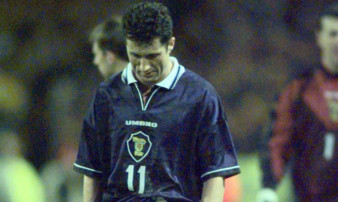
Former internationalist was part of the last Scottish team to beat England on the hallowed turf.
John Collins has a host of great memories from a long and distinguished playing career.
He became Celtic’s first million-pound player, won the French League with Monaco and graced the Premiership with Everton and Fulham.
But being part of the last Scotland team to win at Wembley is something he’ll never forget.
The 45-year-old hopes some of his fellow countrymen will be left with the same long-lasting satisfaction on Wednesday.
In November, 1999 the Scots beat England 1-0 in the second-leg of the Euro 2000 play-off. Although they lost 2-1 on aggregate, there was a feeling that pride had been restored by the men in dark blue.
Collins said: “It was my last match for Scotland and I walked off hearing the Tartan Army singing.
‘For me, I think it was a good time to bow out. When I close my eyes and think back to beating the English, it is a good memory.
“I am very proud of what we did that night. We went down there having lost 2-0 at Hampden but there was still a feeling within the camp that we could get a result.
“England didn’t dominate us at Hampden. They’d scored two good goals from Scholes, but they never pinned us in and we were very confident as a team.
“In massive games like Scotland against England, you have got to go and express yourself. If you go onto the pitch with fear, players hide and you are a dead duck. The current players must go down there with everyone wanting the ball.
“It is an even better stadium now. It is a sensational venue for a game and I am sure every player has got to be really, really excited.”
Fourteen years have passed since Collins hung up his international jersey. But he believes the recipe for success at Wembley remains the same.
The former Hibs’ boss recalls manager Craig Brown asking him and Barry Ferguson to dominate possession in the midfield.
They took up the challenge and excelled. Can Scotland do it again?
He said: “That was always the plan. Could we get hold of the ball and silence the crowd?
“England are so used to teams going there and sitting off them, admiring them and thinking they’ll just play second fiddle and watch them dominate the ball.
“They have good players, but I don’t think they’ve got players you would be petrified of, no-one you’d think would tear you to shreds.
“It’s maybe unrealistic to expect us to dominate, but we’ve got to hope to get a hold of the ball and keep it during periods of the game.
“The likes of Scott Brown can do that. He won’t be intimidated by anyone.
“We have to make them chase the ball and work to get it back.”

Enjoy the convenience of having The Sunday Post delivered as a digital ePaper straight to your smartphone, tablet or computer.
Subscribe for only £5.49 a month and enjoy all the benefits of the printed paper as a digital replica.
Subscribe